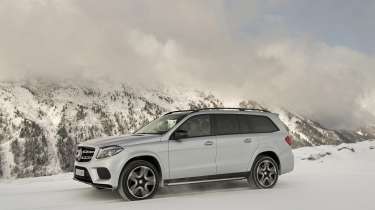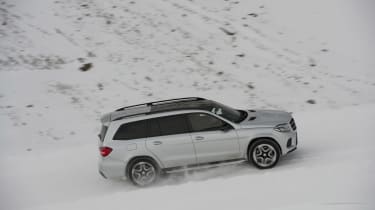Mercedes-Benz GLS review - Range Rover alternative with its own appeal
Not much of an entertainer, the new GLS is nevertheless a compelling alternative to the Range Rover
What is it?
The largest model in Mercedes’ off-road range. As GLA is to A-class, GLC is to C-class and GLE is to E-class, so GLS is the rough-road equivalent to the firm’s S-class luxury saloon. Unlike some of the models lower down the range though, the GLS doesn’t use the saloon’s platform. Instead, it’s a steady evolution of the old range-topping GL.
Engine, transmission and 0-60 time
While Mercedes will offer a range of four engines worldwide, UK customers will get just two – a sensible GLS 350d with a 3-litre V6 turbodiesel, and a rather less sensible GLS 63 AMG with Mercedes’ familiar 5461cc turbocharged V8.
Reaching 62mph in 4.6sec, the latter offers suitably startling performance for a car of its size, though only the diesel (and the not-for-UK V6 and V8 petrol models) was available to test.
It develops a useful 254bhp at 3400rpm and a healthy 457lb ft of torque from 1600-2400rpm, deployed through a new nine-speed automatic transmission and standard 4Matic full-time all-wheel drive. The 62mph mark passes in 7.8 seconds from rest, with a 138mph top speed.
For those concerned with such things, the GLS’s luggage area can expand from 680 to 2300 litres depending on the seating configuration, with a maximum payload capacity of 815kg and towing ability of up to 3500kg. Combined fuel consumption for the diesel models is 37.2mpg; it’s 23mpg for the GLS 63 AMG.
Technical highlights
Mercedes is particularly proud of its 9G-Tronic automatic, which helps contribute to that combined economy of nearly 40mpg. A torque converter automatic rather than a dual-clutch, the ‘box mixes and matches the output of four planetary gearsets to deliver its nine ratios.
More reviews
The method by which it does so is far too complicated to explain here in detail, but the benefits are an even spread of ratios, and an ultra-tall top gear (resulting in around 1350rpm at 75mph) for economical cruising. It also has fast and smooth shifts, and it's compact, taking up no more space and weighing less than the 7-speed unit it succeeds. The torque converter is highly efficient too, at 92 per cent.
Airmatic suspension with adaptive damping is standard, and various driving modes can be selected depending on driving style and environmental conditions. These modes not only adjust suspension settings, but also alter throttle response and gear selection. Further broadening the driving experience is an optional off-road package, which liberates an extra 100mm of ground clearance (to 306mm) and adds a low-range gearbox and centre diff lock.
What’s it like to drive?
Commanding. While the Austrian test routes provided plenty of traffic-free space in which to navigate, the GLS will undoubtedly feel every millimetre of its 2141mm width and 5130mm length on crowded UK roads.
Its 2455kg kerbweight is always apparent, too. The brakes are strong but always need a slightly firmer prod than you’re expecting, and while the air suspension keeps the GLS commendably level during cornering, the body takes a few moments to settle if you ask for quick direction changes. However, it’s far from being all at sea and has impressive levels of grip, even on the wet roads of our test route and on winter tyres.
Steering seems tuned more for ease of use than it is feel, but weighting is consistent as you wind on more lock. It makes the GLS surprisingly easy to place despite its girth, aided further by a commanding driving position and ample glazing. The interior is a thoroughly pleasant place to spend time in fact, though it’s a shame more inspiration from the S-class cabin hasn’t infiltrated the GLS – there’s no impressive TFT instrument display here, for example, nor is progress quite as serene as it is in the range-topping saloon.
The six-cylinder diesel is smooth and strong too, while true to Mercedes' word, gearshifts are near-imperceptible.
Fifteen minutes on a snow- and ice-covered Alpine pass did allow Mercedes to demonstrate some of the GLS’s off-road orientated features an S-class could not match. While winter tyres certainly contribute, it’s easy to pick out the differences between Winter mode and Sport mode, for instance. Throttle response is dulled, higher gears are selected and the traction control minimises histrionics under oafish throttle inputs.
Rivals
The list of luxury SUVs with seven seats is a reasonably healthy one, but the list of those with a third row big enough to carry actual humans – one of the GLS’s USPs – is much slimmer.
In terms of prestige, size and equipment the GLS will take up a small chunk of the market occupied by Land Rover’s Range Rover – prices for the British SUV start at £74,950 for a 3.0 TDV6 Vogue, slightly more than the entry-level GLS. The Range Rover is arguably better to behold, but like the GLS it doesn’t entertain so much as make every journey an imperious, relaxing event.
Price
Just three models will reach the UK, starting with the GLS 350d in AMG Line trim at £69,100. Above that is the £78,095 Designo Line, while the £102,330 Mercedes-AMG GLS 63 tops the range.



